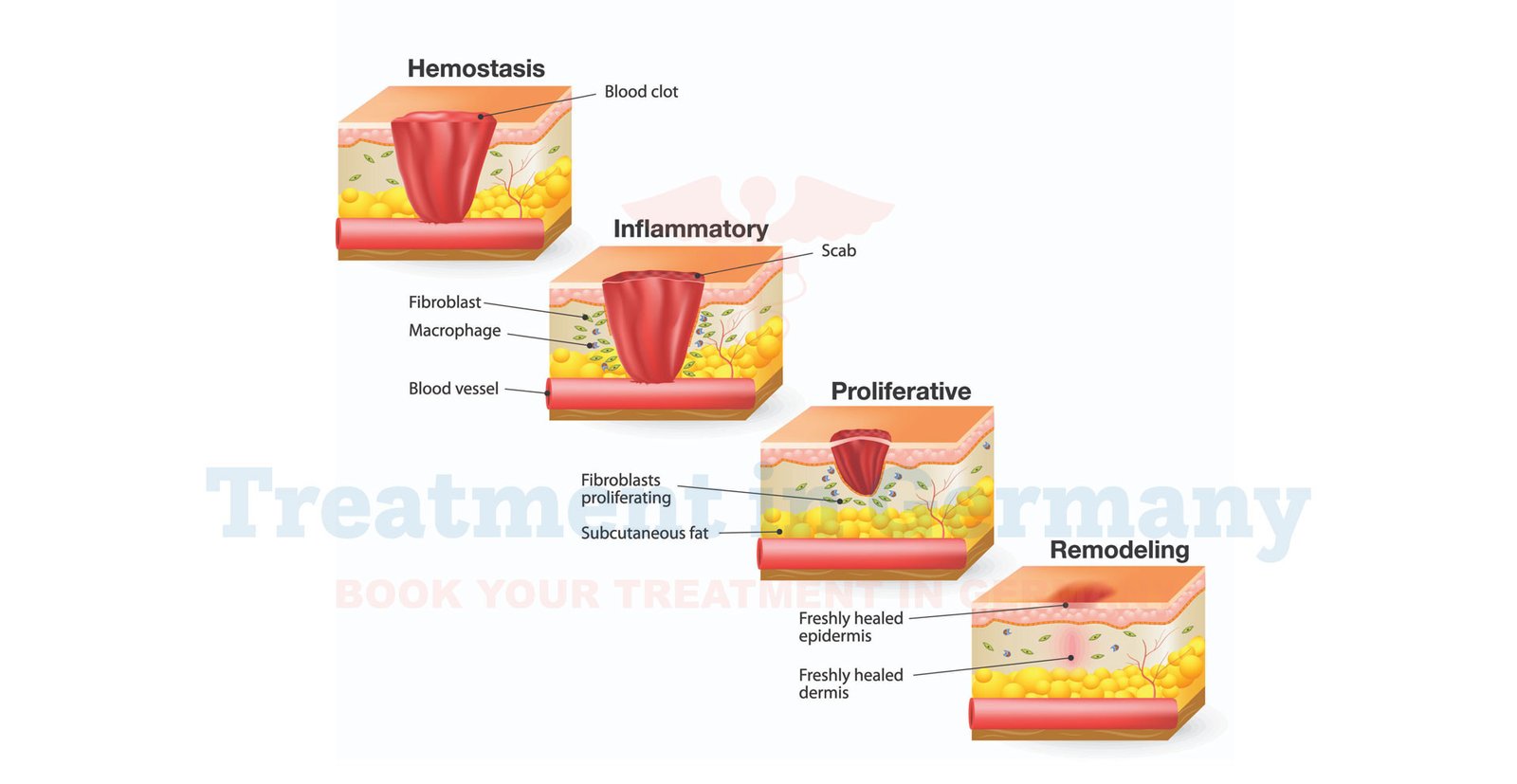Wound healing is a complex biological process involving tissue repair after injury. It is a critical aspect of healthcare, as chronic or improperly managed wounds can lead to severe complications, including infections and amputations. Effective wound healing requires a combination of proper care, advanced medical technology, and expert intervention. Germany is at the forefront of innovative wound healing treatments, offering state-of-the-art facilities, cutting-edge technologies, and experienced specialists for optimal recovery.
Wound healing is the body's natural process of restoring skin and tissue integrity after damage caused by injuries, surgery, or medical conditions. This intricate process involves four stages: hemostasis (blood clotting), inflammation, proliferation (new tissue formation), and remodeling (scar tissue formation). In cases where healing is delayed or impaired, specialized medical intervention is necessary.
Wounds are classified into different types based on their cause and healing complexity:
Acute Wounds:
Caused by trauma such as cuts, burns, or surgical incisions.
Typically heal within a predictable timeframe with proper care.
Chronic Wounds:
Fail to heal within the expected time due to underlying conditions.
Examples include diabetic ulcers, pressure sores, and venous ulcers.
Infected Wounds:
Contaminated with bacteria, causing delayed healing and complications.
Surgical Wounds:
Result from incisions made during surgeries, requiring meticulous care to prevent infections.
Risk Factors for Impaired Wound Healing
Several factors can delay or impair wound healing:
Systemic Conditions:
Lifestyle Factors:
Obesity and a high body mass index (BMI) increase the risk of chronic wounds.
Smoking hinders oxygen delivery to the affected tissues.
Age:
Older adults experience slower healing due to reduced cellular activity.
Infections:
Bacterial or fungal infections can lead to complications and delayed recovery.
Poor Nutrition:
Lack of essential vitamins and proteins affects tissue regeneration.
Symptoms of Impaired Wound Healing
Delayed wound healing may present the following symptoms:
Persistent redness, swelling, or pain around the wound.
Excessive discharge or pus from the wound site.
Fever or signs of infection.
Black or yellow discoloration of the wound tissue.
Lack of improvement despite initial treatment efforts.
Diagnosis and Diagnostic Tools
Germany’s advanced healthcare system offers precise diagnostic tools to assess wound healing issues:
Physical Examination:
Evaluates the size, depth, and condition of the wound.
Blood Tests:
Check for underlying conditions such as diabetes, anemia, or infections.
X-rays:
Detect bone infections or foreign objects in the wound.
MRI (Magnetic Resonance Imaging):
Provides detailed images to evaluate soft tissue and deep infections.
CT (Computed Tomography) Scan:
Offers high-resolution images of the wound area to assess complications.
Wound Cultures:
Identify bacterial or fungal infections that may delay healing.
Wound Healing Treatment in Germany
Germany is renowned for its cutting-edge approach to wound care, combining advanced medical technologies and multidisciplinary expertise. Treatment plans are tailored to individual needs, focusing on accelerating healing and preventing complications.
Initial Wound Care
Debridement:
Removal of dead or infected tissue to promote healthy healing.
Dressing Changes:
Specialized dressings, including antimicrobial and moisture-retentive options, are used.
Advanced Therapies
Negative Pressure Wound Therapy (NPWT):
Uses vacuum-assisted devices to remove excess fluid and promote tissue growth.
Hyperbaric Oxygen Therapy (HBOT):
Enhances oxygen delivery to the wound, speeding up the healing process.
Skin Grafting and Tissue Engineering:
Involves transplanting healthy skin or using bioengineered materials to cover large wounds.
Medication and Supplements
Antibiotics:
Prescribed to treat or prevent infections.
Pain Relievers:
Manage discomfort and inflammation.
Nutritional Supplements:
Support healing through enhanced nutrition.
Physical and Complementary Therapies
Physical Therapy:
Focuses on improving mobility and preventing complications in wound-related cases.
Complementary Therapies:
Includes massage, acupuncture, and laser therapy to promote recovery.
Why Choose Wound Healing Treatment in Germany?
Germany offers unparalleled advantages for wound care:
Innovative Treatment in Germany:
Access to the latest medical advancements and research-driven care.
Hospitals in Germany:
World-class facilities equipped with modern technologies for diagnosis and treatment.
Doctors and Surgeons in Germany:
Specialists with extensive experience in managing complex wound cases.
Holistic Approach:
Combines medical treatments with lifestyle and nutritional guidance.
Minimal Waiting Times:
Efficient healthcare system ensures timely interventions.
Rehabilitation Excellence:
Comprehensive rehabilitation programs support long-term recovery.
Conclusion
Effective wound healing is crucial for preventing complications and improving quality of life. Germany has emerged as a global leader in wound care, offering innovative treatments, skilled specialists, and advanced diagnostic tools. Whether it’s addressing acute injuries, managing chronic wounds, or providing comprehensive rehabilitation, Germany provides a holistic and patient-centered approach.
Choosing wound healing treatment in Germany ensures access to cutting-edge technology, world-class facilities, and expert care, making it a preferred destination for patients seeking exceptional medical outcomes.
👉 Contact us for further information and receive a complimentary consultation.


.webp)
 (1).webp)

.webp)
 (1).webp)


.webp)
 (1).webp)

.webp)
 (1).webp)
